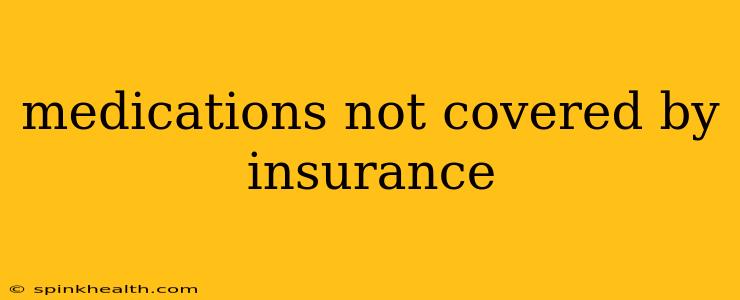Navigating the Maze: When Medications Aren't Covered by Insurance
The sinking feeling. You've just received your prescription, only to realize your insurance company won't cover the cost. This scenario is far more common than many realize, leaving patients facing difficult choices. This isn't just about the immediate financial burden; it's about access to vital healthcare. This post explores the reasons behind non-coverage, strategies to manage costs, and resources that can help.
Let's start with a story. Sarah, a young professional with a chronic illness, recently learned her new medication, a crucial part of her treatment plan, wasn't on her insurance formulary. The price? A staggering $500 a month. Sarah’s story, unfortunately, isn't unique. Many people find themselves in similar situations, grappling with the high cost of prescription drugs.
Why Aren't My Medications Covered by Insurance?
This is a frequently asked question, and the answer isn't always straightforward. Several factors contribute to a medication not being covered:
-
Formulary Exclusions: Most insurance plans have a formulary—a list of approved medications. Drugs not on this list are typically not covered, even if your doctor prescribes them. This often comes down to cost-effectiveness analyses conducted by the insurance company, considering factors like efficacy, safety, and the availability of cheaper alternatives.
-
Prior Authorization Requirements: Some medications require prior authorization, meaning your doctor needs to justify the prescription before the insurance company will approve coverage. This process can be time-consuming and frustrating, often involving multiple phone calls and paperwork.
-
Step Therapy: Insurance companies sometimes require patients to try cheaper, generics or other medications before approving coverage for a more expensive or newer drug. This is to ensure that less costly options are exhausted before resorting to more expensive treatments.
-
Tiered Systems: Many insurance plans organize medications into tiers based on cost and type. Brand-name drugs typically reside in higher tiers, leading to higher out-of-pocket costs for the patient. Generic alternatives, when available, are usually in lower tiers.
What Can I Do If My Medication Isn't Covered?
Facing a high cost for necessary medication is undeniably stressful. Here are some potential solutions:
-
Appeal the Decision: Don't give up easily! You can appeal your insurance company's decision. This often requires providing detailed medical documentation outlining why the specific medication is necessary for your health. Your doctor can assist with this process.
-
Negotiate with Your Pharmacy: Pharmacies sometimes have patient assistance programs or can offer discounts. Ask your pharmacist about options.
-
Explore Manufacturer Coupons and Patient Assistance Programs: Many pharmaceutical companies offer coupons or patient assistance programs to help offset the cost of their medications. Check the manufacturer's website for details.
-
Look into State and Federal Programs: Depending on your income and other factors, you may qualify for assistance programs like Medicaid or the Medicare Part D Low-Income Subsidy.
-
Consider Generic Alternatives: If a generic version of your medication exists, explore it as a more cost-effective option.
-
Talk to Your Doctor: Discuss alternatives with your doctor. Perhaps a different medication with similar efficacy but lower cost is available.
What if I Can't Afford My Medications Even After Trying All This?
This is a serious situation that necessitates seeking help. Contact your doctor or a social worker for guidance. They might be able to connect you with additional resources, including local charities or non-profit organizations that provide medication assistance.
Facing the reality of uncovered medication costs can be daunting, but knowing your options and utilizing the available resources is crucial. Remember, you're not alone in this struggle, and help is available. Don't hesitate to reach out for assistance. Your health is paramount.

